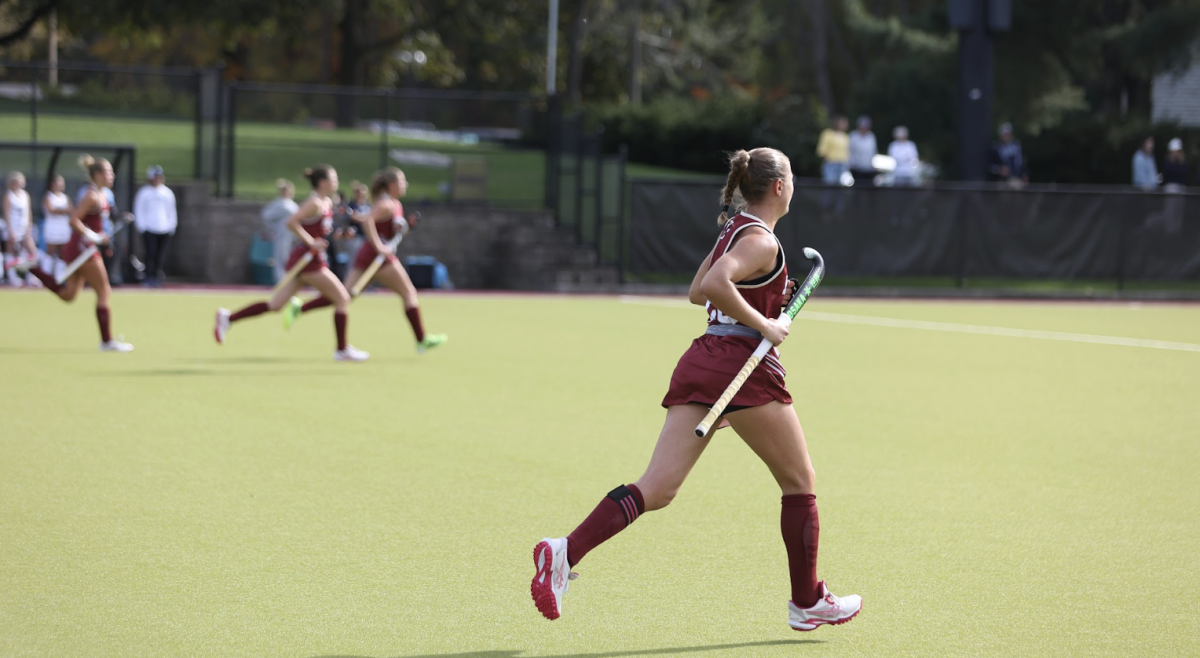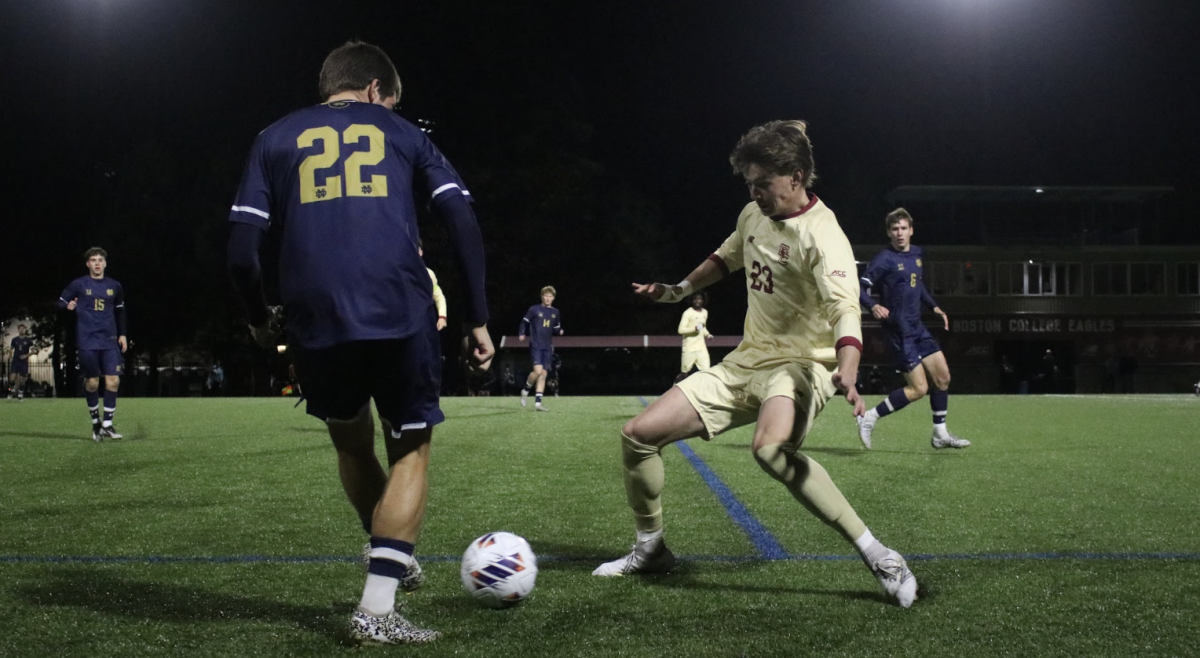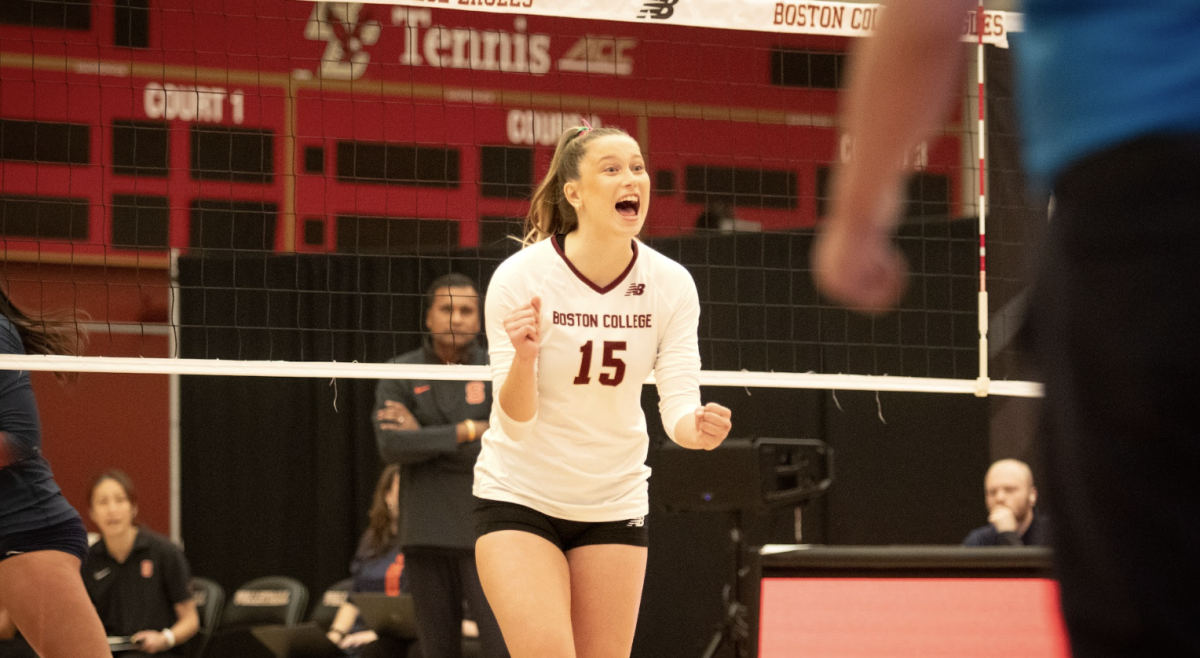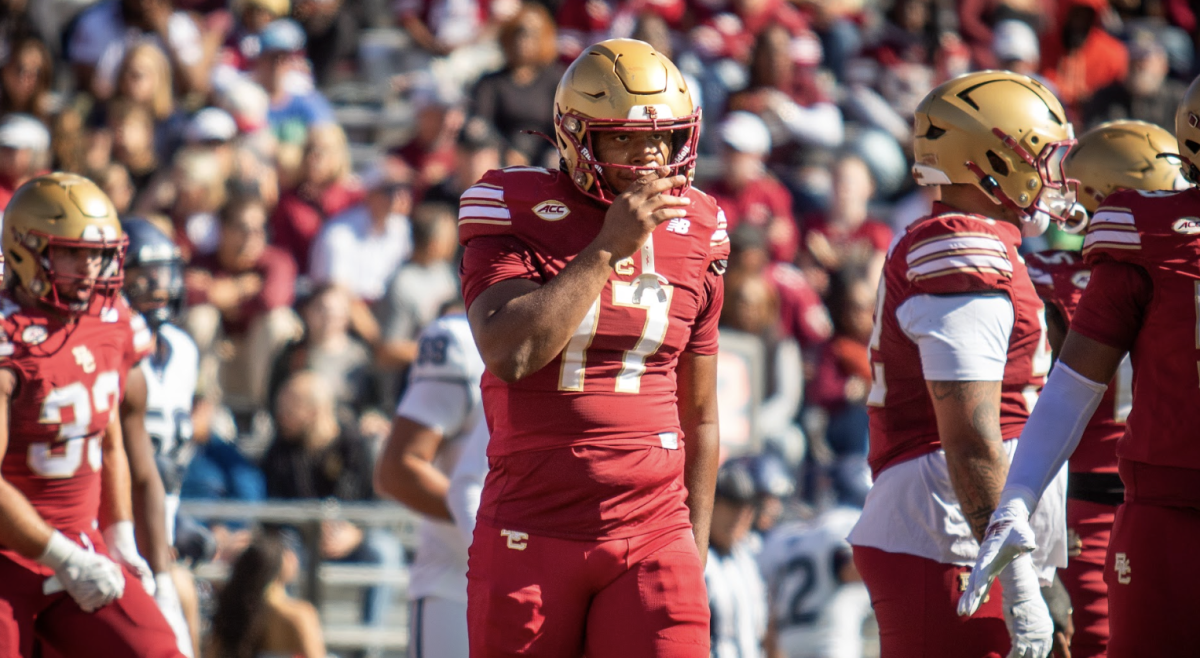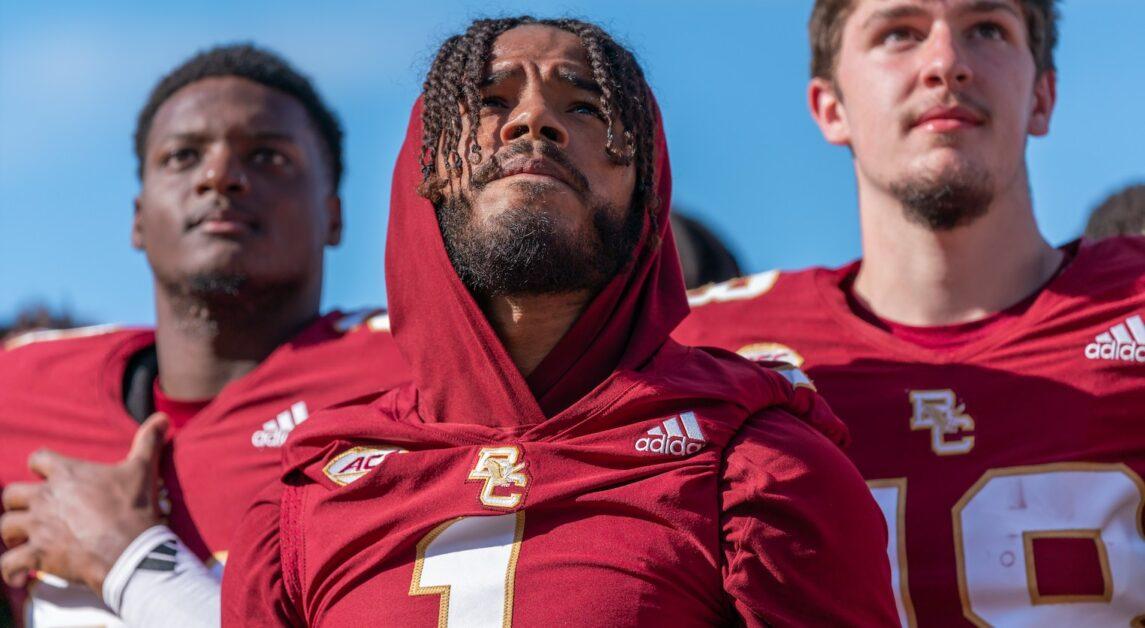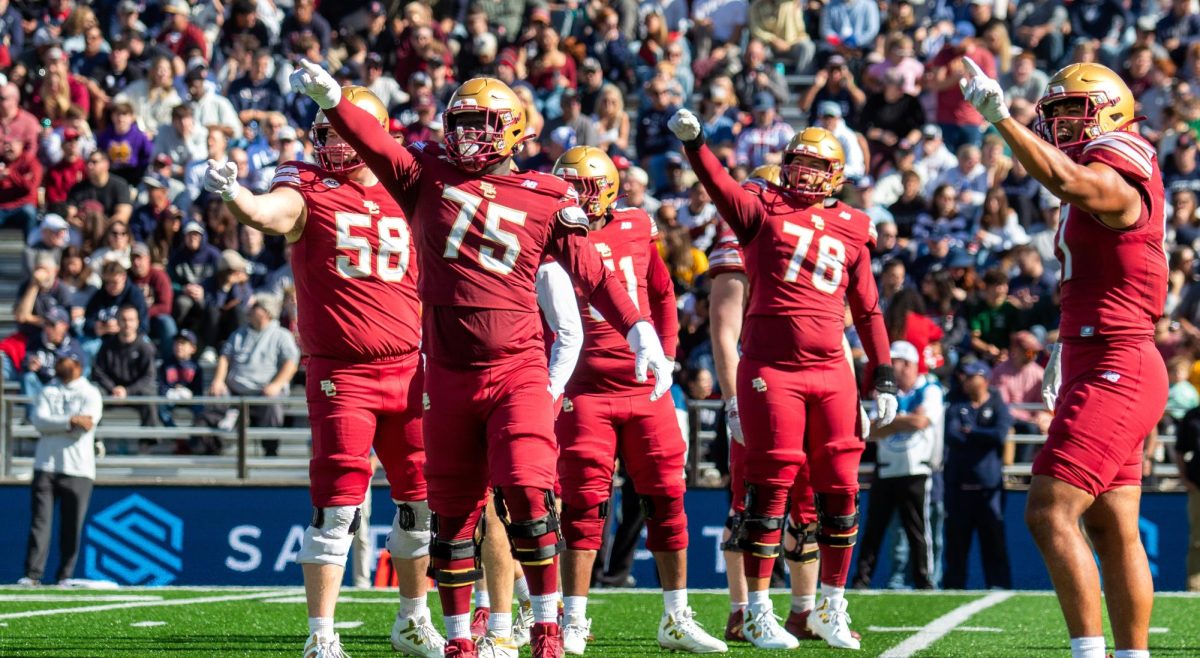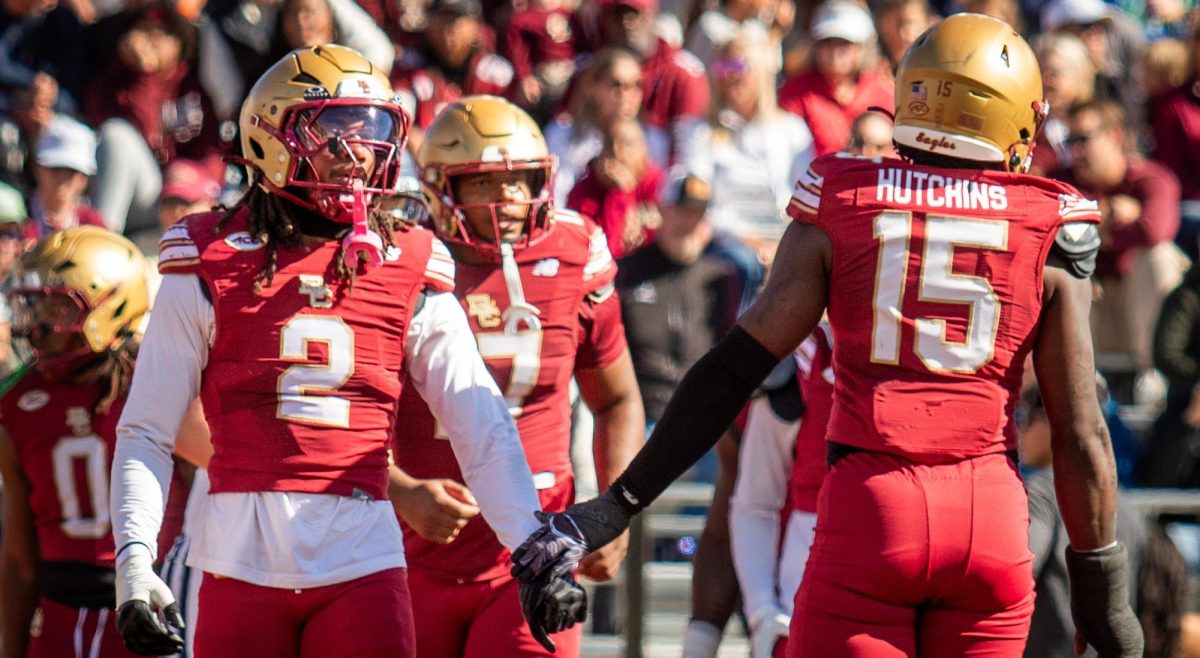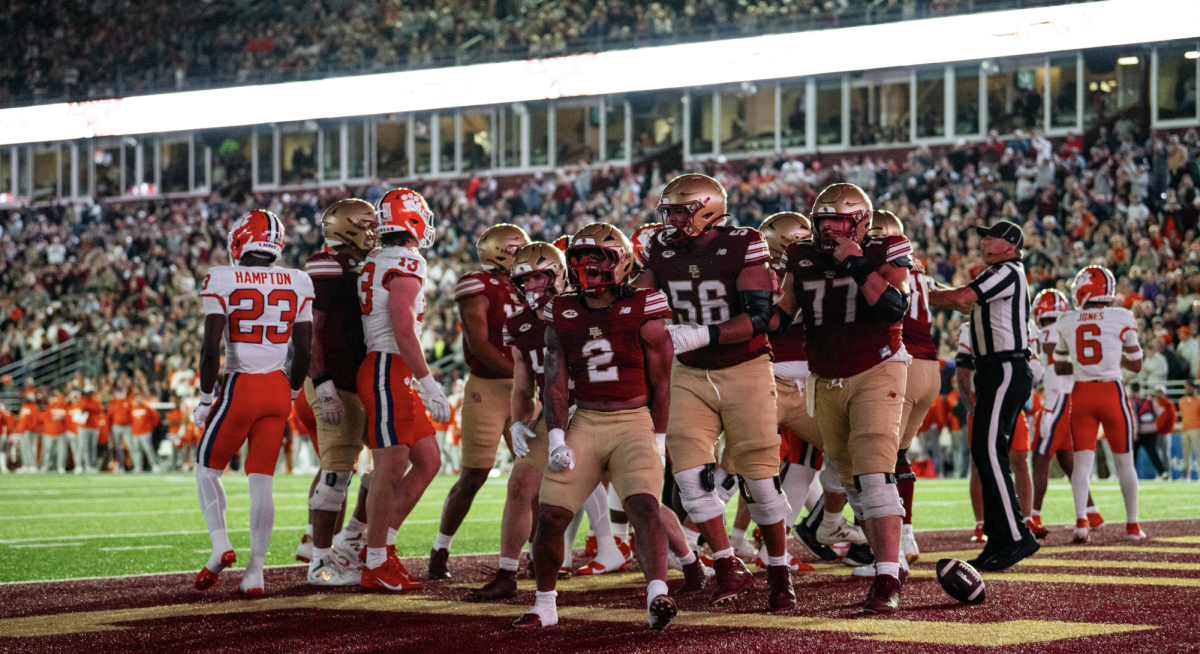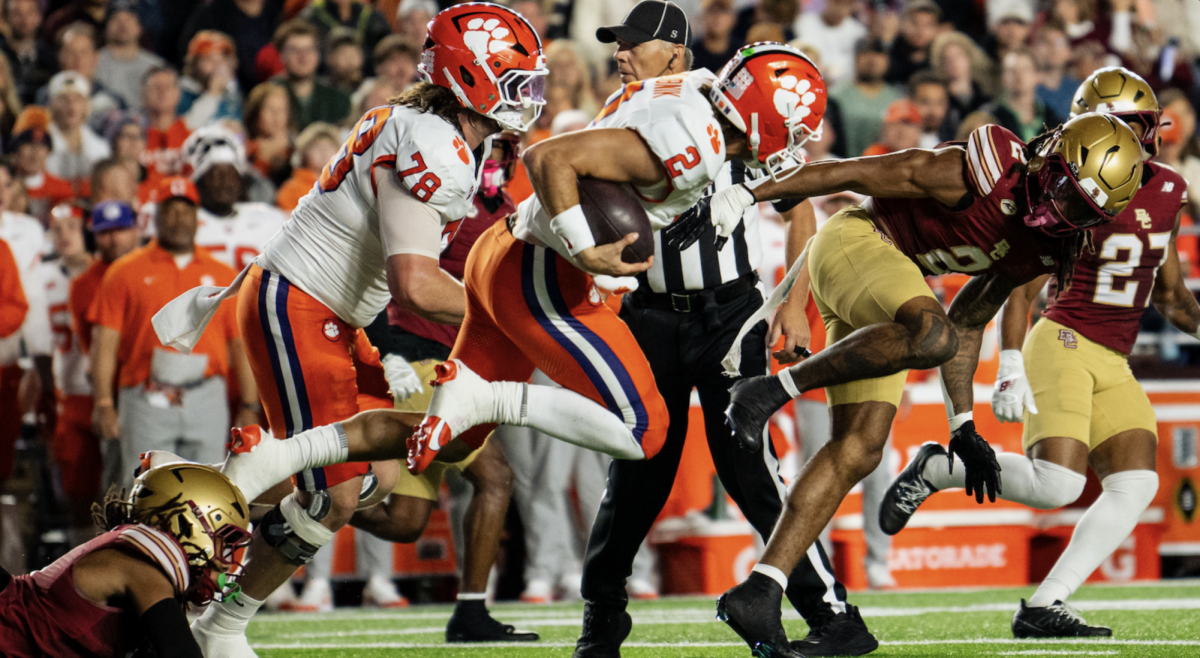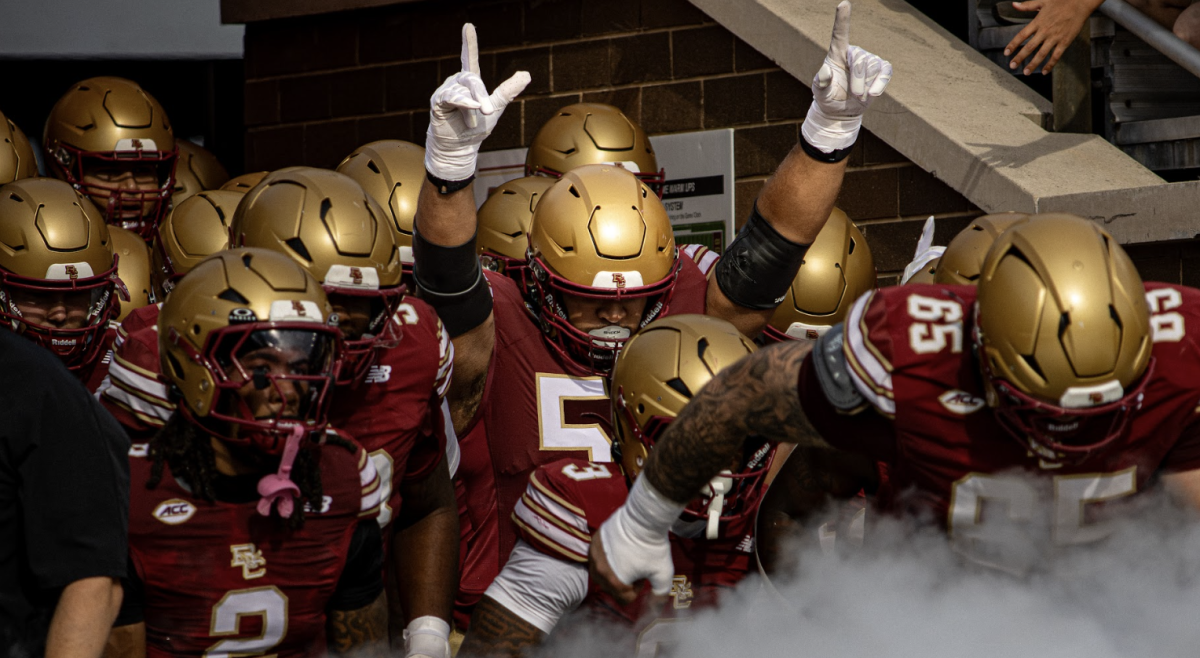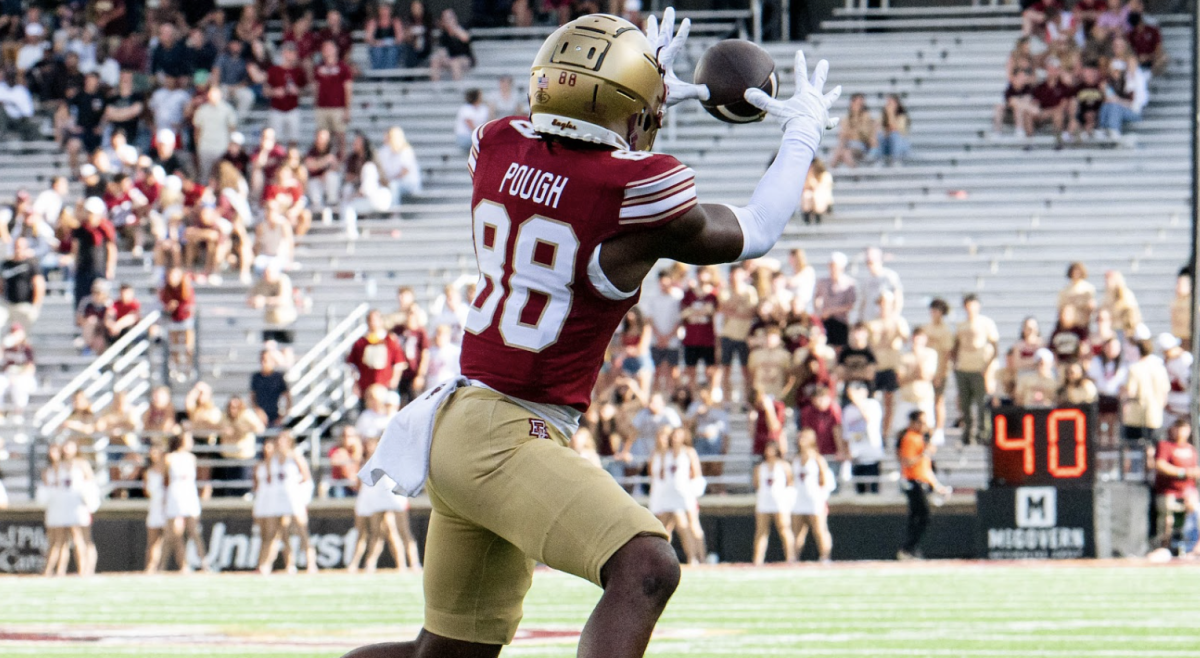Cindy Ezeiruaku wasn’t exactly a fan of her son’s decision to play football. The 7-year-old had tried baseball, he’d tried soccer, and he’d tried basketball.
But football was different. Football, he knew, was where his future lay.
To earn his mother’s grudging approval, Donovan Ezeiruaku made a commitment.
“‘You have to get all good grades, and if you come home with one bad grade—that’s it,’” Cindy said. “‘No more football, and that will be that.’”
Ezeiruaku stayed true to his word so he could stay on the football field. It wouldn’t be the last time.
Whether it was staying home to play alongside his childhood friends at Williamstown High School or refusing to entertain transfer portal offers while starring for Boston College football, ironclad commitment is second nature to Ezeiruaku.
“He never failed on his commitments,” Cindy said. “He stayed loyal to what it is he wanted to do—his dreams and his aspirations.”
That loyalty produced one of the greatest edge rushers BC has ever seen.
Through four seasons in Chestnut Hill, Ezeiruaku has seen it all—two head coaches, a 3–9 season, and a bowl win. He’s also done it all. Ezeiruaku has delivered sacks, game-changing forced fumbles, poised leadership, and more sacks.
He’ll leave BC as one of the NCAA’s premier defensive ends and with a management degree in his hands as well.
“He’s what it’s all about at Boston College,” Eagles head coach Bill O’Brien said. “He’s a captain, he’s a great student, great player, one of the best players in the country.”
–
Unlike the other sports Ezeiruaku tried growing up, football demands a unique aggressiveness. A hunger for contact doesn’t just help—it’s a requirement.
His youth basketball coach Antoine Sabb recognized that aggressiveness in a 7-year-old Ezeiruaku. He knew the hardwood wasn’t its proper home.
“I was really aggressive playing basketball, and he recommended to my dad that I should try out football because of how aggressive I was,” Ezeiruaku said.
Sabb, whose son Keon Sabb currently starts at Alabama, is familiar with promising young talent. But Ezeiruaku, even at the age of seven, still managed to stand out.
“He was on the [basketball] team with some kids that could play,” Sabb said. “He was very explosive, so you could tell obviously that he was an elite athlete.”
The same aggressiveness that made Ezeiruaku such a seamless fit on the football field was what concerned his mother.
“I was furious,” Cindy said. “He’s gonna be knocking over kids, or they’re gonna knock him over.”
Sabb, convinced of Ezeiruaku’s talent, tried persuading his parents to let him try out for the youth football team. Cindy wouldn’t budge.
“[Sabb] had approached my husband about letting Donovan try out football,” Cindy said. “I was totally against it when they told me. I was like ‘No. They can do track. They can do tennis. Football—no.’”
Sabb persisted, however, and with his father Sonyx’s assistance, Ezeiruaku made his way to tryouts.
“They kind of snuck me out on the field—not really telling my mom all the information of where I was going that specific day,” Ezeiruaku said.
Once he made the team, it didn’t take Ezeiruaku long to fall in love with the sport. Football had it all—the competition, the hard contact, and the allure of grand aspirations. The choice couldn’t have been more obvious for him.
“I chose the sport my mom hated the most,” Ezeiruaku said.
–
From his first days on the football field, Ezeiruaku took the sport seriously. To some, he took it a little too seriously.
Instead of tending to the usual youth football worries, like scoring touchdowns or just having fun, Ezeiruaku thought bigger. He wanted to win, and if winning required him to coach up his teammates on the sidelines, then that’s what he would do.
“Parents had mistaken his passion for arrogance,” Cindy said. “They would say, ‘Why is he talking to my child like he’s the coach?’”
That passion permeated his entire approach to football from the very beginning. No sacrifice was too big, so long as it served his larger purpose. Some nights, Ezeiruaku found himself skipping meals to keep himself under his pee-wee team’s weight limit.
Ezeiruaku’s relentless dedication eventually helped him win over his mom’s approval.
“He was very diligent,” Cindy said. “I knew this would be his thing.”
His work ethic and consistent progress didn’t just catch his mother’s eye. It also caught the attention of one of New Jersey’s most accomplished high school football head coaches. Before Ezeiruaku reached high school—in fact, before he even settled on playing defensive end—he had landed on Frank Fucetola’s radar.
“He had already made a name for himself,” Cindy said. “They knew who he was.”
Ezeiruaku, dead set on making football his career, wasn’t sure if public school was the right choice for him.
“Going into my freshman year, I didn’t necessarily know if I was going to go to my town’s public school,” Ezeiruaku said. “I had interest in going to the private schools in the area because I thought that was the best opportunity for me to play college football.”
Cindy, however, was just as focused on her son’s education. To her, staying home to attend Williamstown High School offered just as much academic potential as any other private school option.
But what sold Ezeiruaku on his public school wasn’t just the education it offered. Ultimately, Ezeiruaku said it was conversations with his childhood friends and youth football teammates that persuaded him to stay home in Williamstown, N.J.
“We knew he was gonna be a good one,” Fucetola said. “I had no idea it would be this extreme.”
–
Although the contact was what originally drew him to the football field, it wasn’t necessarily all he wanted to do on the gridiron. Like many young football players, the glamour the sport provides appealed to Ezeiruaku.
“I didn’t really want to play defensive end,” Ezeiruaku said. “I really thought I was gonna play wide receiver in high school. I really wanted to catch passes, catch touchdowns, things like that.”
It took until his junior year of high school for him to buy into playing defensive end, but once he bought in and embraced his natural strengths within the position, the results came quickly.
He started modeling his game off star pass rushers both established and ascendant, like Von Miller and Micah Parsons, all while developing the requisite strength and athleticism.
“When he transitioned to high school, I remember the day he sent me his Hudl, his highlight tape, and I was like, ‘Oh my God,’” Sabb said. “That was the year they won the state championship. So it was kind of like, ‘Man, he put it all together.’ It was a proud moment to see—this kid’s a pro.”
Ezeiruaku stacked year after year of incremental growth in every aspect of his game, all while building his appreciation and joy for the position.
“He developed throughout his career getting better each year, from his freshman year to his senior year—just progressing in the game of football [and] digesting everything that was involved in this game,” Fucetola said.
But then came COVID-19. The pandemic brought everything to a pause, including Ezeiruaku’s dreams of playing Power 5 college football.
“It took a while for him to be noticed or recognized,” Cindy said. “He was really concerned about that at first because his goal was to—his dream—was to play college football.”
Eventually, the offers came trickling in. First, it came from Princeton, with other Ivy League schools following suit—every parent’s dream. But Ezeiruaku remained steadfast in his goal. He wanted both a strong education and the bright lights of the Power 5.
That’s when BC stepped in.
As the first Power 5 school to offer him, BC centered its pitch to Ezeiruaku around the University’s strong academics and its coaching staff’s development plan for him. BC’s former defensive line coach Vince Oghobaase led the charge.
“[Oghobaase] really laid out how he was going to develop me into the player that I wanted to be,” Ezeiruaku said. “He laid out and showed me how he was going to work on certain things in my game to get me ready to play in the NFL the way I wanted to.”
Ezeiruaku was sold, and so was Cindy, who had been doing some vetting of her own. All those years after making his original commitment to his mom, Ezeiruaku’s vision was coming to life.
“We’re the type of family that feels like, ‘If it’s meant for you to be, it will follow you,’” Cindy said.
–
Three seasons into his time at BC, Ezeiruaku was stuck. His team had just come off a 7–6 season with a bowl win—both milestones in Ezeiruaku’s BC career at that point. Individually, however, his junior year saw regression.
After breaking out in his sophomore year with 8.5 sacks and an All-ACC Second Team nod, Ezeiruaku managed just two sacks in the following year—one less than he had recorded in his freshman year.
“I think he put too much thought into, ‘I got to get this many. I got to get this many. I got to be better than the year before,’” Cindy said.
The pressure of following up on that breakout sophomore campaign was in his head.
“I just wasn’t playing as fast,” Ezeiruaku said. “I wasn’t really having as much fun. I was forcing it. I just really wanted to make plays.”
So following that season, with a new head coach leading his team, Ezeiruaku got back to the basics and focused on what got him to that point.
“Just remembering young Donovan running around, just going after the ball—just tackle the man with the ball,” Ezeiruaku said.
It didn’t hurt that external doubt fueled Ezeiruaku’s motivation. His family found a Pro Football Focus list of the NCAA’s top defensive ends. Ezeiruaku hadn’t made the cut.
“Obviously I didn’t have the best year last year, so my name wasn’t as talked about going into this year as I would have liked,” Ezeiruaku said. “I saw a post on [Pro Football Focus]—my family actually sent it to me, and they were like, ‘You got to use this as a little bit of motivation to do what you got to do this year.’”
That little spark turned into Ezeiruaku’s phone wallpaper.
“You write the vision down and make it clear,” Cindy said. “Don’t just think of it—write it down. See it.”
After finding freedom both mentally and schematically within Eagles first-year defensive coordinator Tim Lewis’ system, Ezeiruaku exploded in 2024.
He finished his latest, and final, collegiate regular season with a team-high 16.5 sacks—the most in the nation, earning him recognition as 2024’s ACC Defensive Player of the Year.
“Going into this year, now I’m having that fun I was having my sophomore year—just playing football,” Ezeiruaku said.
Those 16.5 sacks also tied Harold Landry’s 2016 BC single-season sack record.
“I would think it’s very safe to say he’s one of the best players to ever play in this program,” O’Brien said.
Ezeiruaku’s ascendance came amid the shadow of lucrative NIL packages and a beckoning transfer portal, something he said is an inescapable reality of today’s college football landscape.
“I think that’s the kind of world we live in,” Ezeiruaku said. “No, it’s definitely not foreign for other schools to try to reach out, whether that’s to somebody in your inner circle talking to you or maybe directly via social media, or whatever the case might be. So it’s definitely not foreign, but that was the case.”
But Ezeiruaku’s football journey began with a commitment. He wasn’t about to stray from his commitment to BC with his professional dreams so close to materializing.
“You can’t put a price on your loyalty,” Cindy said. “You can’t put a price on commitment.”
Those two ingredients have secured him a spot in his position’s upper echelon. They are also about to secure him a job playing on Sundays.
“It was hard to really stay in the moment, instead of worrying about what’s to come, but I’m starting to really think about it now,” Ezeiruaku said. “It’s very exciting, because like I said, I’ve been dreaming [and] playing football since I was 7 years old.”
Ever since he was the strong, aggressive kid on the basketball court, it’s been obvious to those around him that Ezeiruaku’s potential has no ceiling.
“The only thing that’s gonna stop him is him,” Sabb said.



